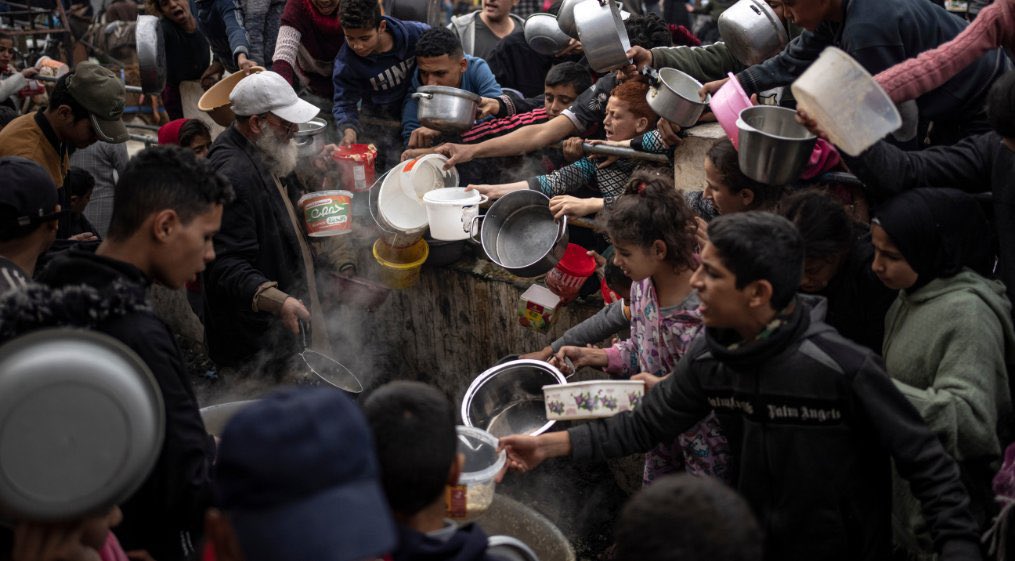A recent UN report reveals a dire food crisis in Gaza, with the besieged Strip accounting for the majority of the world’s famine-affected population due to Israel’s siege.
A United Nations food expert has highlighted that the majority of the global population suffering from famine is located in Gaza, as a result of Israel’s siege on the Strip.
Global food researchers have discovered that around 706,000 individuals worldwide are facing “catastrophic” or “famine” levels of hunger. About 577,000 of these are Palestinians in Gaza, as detailed in a report by the UN-backed Integrated Food Security Phase Classification (IPC).
This equates to approximately 80% of the global famine-affected population, a statistic highlighted by Arif Husain, the chief economist for the UN World Food Programme, in a recent interview with Isaac Chotiner of The New Yorker.
Husain expressed his concern, stating, “I’ve been doing this for the past two decades, and I’ve never seen anything like this in terms of severity, scale, and speed.”
He emphasised the unprecedented nature of the crisis in Gaza, where the entire population is grappling with acute hunger.
The report by the IPC also indicates the bleak potential for the entire population of Gaza, approximately 2.2 million people, to fall into “full-fledged famine” within the next six months if Israel’s blockade persists.
The blockade has severely hindered the distribution of food and other essentials in the region, with ongoing bombing campaigns.
Under the IPC classification system, famine is determined by three criteria: over 20 percent of a region’s population starving, 30 percent of children being malnourished or extremely thin, and a mortality rate that is double the average.
Currently, Gaza meets only the first of these criteria, but the situation is rapidly deteriorating.
Husain stressed the urgency of the situation, noting that nearly a quarter of Gaza’s population is already experiencing famine, with half of the population in a state of emergency food insecurity and the remainder facing an acute hunger crisis.
He said, “The bottom line is that, in Gaza, pretty much everybody is hungry at the moment.”
The economist concluded with a call to action, emphasising the need for preventative measures rather than reactive ones. “You need to act to avoid a famine, right? Because if you say, ‘O.K., let’s act when there is a famine,’ that means people have already died, children are already wasted, people are already starving. That’s not the point. The point is that we should never let a population reach that state,” he said.
Human Rights Watch, an international non-governmental organisation, has accused Israel of using starvation as a weapon of war in Gaza.
According to their statement, Israel is deliberately blocking the delivery of water, food, and fuel in Gaza, which has led to growing hunger and thirst among the population, especially as humanitarian aid is severely restricted amidst Israel’s bombing campaign.
South Africa has filed an 84-page suit against Israel at the International Court of Justice (ICJ) in The Hague. This action marks the first time a country has taken such a step, aiming to increase international pressure on Israel to stop its bombardment of the Gaza Strip, which began on October 7, 2023, and has resulted in over 22,000 civilian casualties, including a large number of children.
South Africa’s case alleges that Israel has committed genocide in Gaza, in violation of the 1948 Genocide Convention. The suit details various actions that constitute genocidal behaviour, including mass killings, particularly of children, the destruction of homes, forced displacement, and the imposition of a blockade on essential supplies like food, water, and medical assistance.
The suit also highlights measures that prevent Palestinian births by destroying health services critical for pregnant women and infants.
The South African government further accuses Israel of failing to prevent and prosecute incitement to genocide, referencing statements from Israeli officials that appear to justify the killings and destruction in Gaza.
One such statement by Prime Minister Benjamin Netanyahu compared Palestinians to the biblical nation of Amalek, which was commanded to be destroyed.
Netanyahu’s remarks on deepening the fighting and the longevity of the battle were also cited as evidence of genocidal intent.
The scope of the Israeli military’s operations, including indiscriminate bombings, executions of civilians, and the blockade of essential supplies, are presented as proof of Israel’s actions pushing Gaza to the brink of famine.
Besides allegations of genocide, South Africa’s suit claims that Israel is committing other violations of international law in Gaza, including attacks on Palestinian culture by targeting sites of religious, educational, artistic, and historical significance, as well as hospitals and other critical infrastructure.







